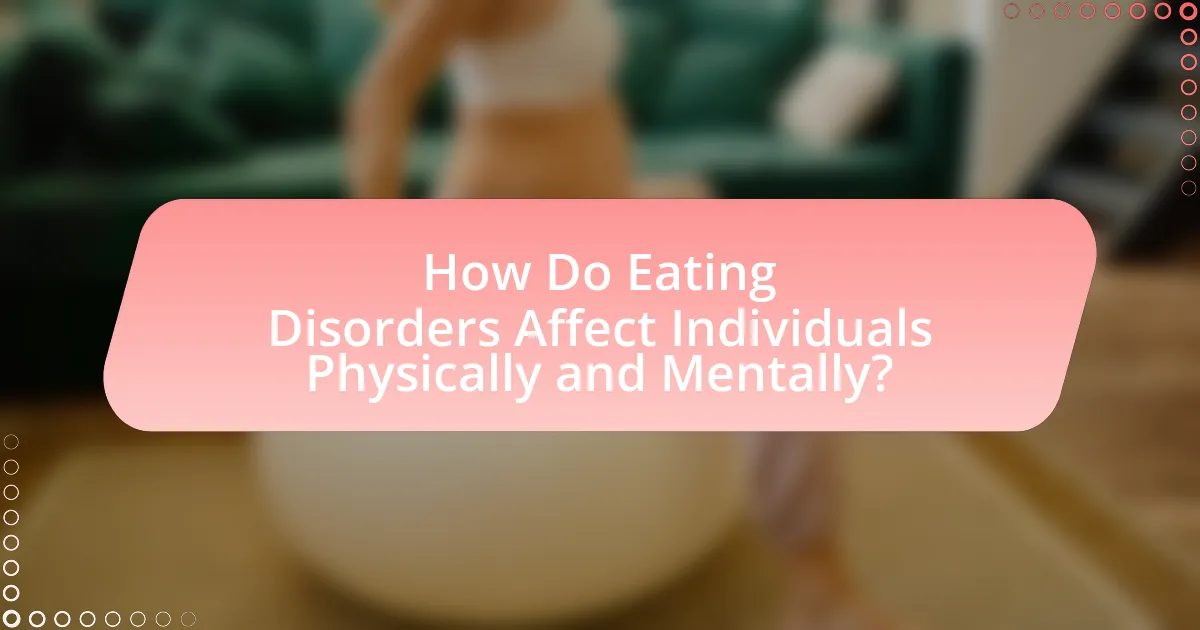Eating disorders are serious mental health conditions that involve abnormal eating habits, leading to significant physical and emotional health issues. This article explores the various types of eating disorders, including anorexia nervosa, bulimia nervosa, and binge-eating disorder, along with their symptoms, causes, and the impact on individuals’ physical and mental health. It emphasizes the importance of understanding these disorders for effective prevention and treatment, highlighting the roles of genetic, psychological, and sociocultural factors. Additionally, the article discusses effective treatment options, the influence of family and social support on recovery, and practical steps for promoting awareness and prevention of eating disorders.

What are Eating Disorders and Why Do They Matter?
Eating disorders are serious mental health conditions characterized by abnormal eating habits that negatively impact physical and emotional health. They matter because they can lead to severe health complications, including malnutrition, heart issues, and even death; for instance, anorexia nervosa has the highest mortality rate of any mental illness, with studies indicating that approximately 10% of individuals with this disorder may die from related complications. Understanding eating disorders is crucial for effective prevention and treatment, as early intervention can significantly improve outcomes and quality of life for affected individuals.
What are the different types of eating disorders?
The different types of eating disorders include anorexia nervosa, bulimia nervosa, binge-eating disorder, and other specified feeding or eating disorders (OSFED). Anorexia nervosa is characterized by extreme restriction of food intake and an intense fear of gaining weight. Bulimia nervosa involves cycles of binge eating followed by compensatory behaviors such as vomiting or excessive exercise. Binge-eating disorder is marked by recurrent episodes of eating large quantities of food without subsequent purging behaviors. OSFED encompasses eating disorders that do not meet the criteria for the other specific disorders but still cause significant distress or impairment. According to the National Eating Disorders Association, these disorders affect millions of individuals and can lead to severe health complications if left untreated.
How do anorexia, bulimia, and binge eating disorder differ?
Anorexia, bulimia, and binge eating disorder are distinct eating disorders characterized by different behaviors and psychological patterns. Anorexia involves extreme restriction of food intake, leading to significant weight loss and an intense fear of gaining weight. Bulimia is marked by cycles of binge eating followed by compensatory behaviors such as vomiting or excessive exercise to prevent weight gain. Binge eating disorder, on the other hand, is characterized by recurrent episodes of eating large quantities of food without subsequent purging behaviors, often accompanied by feelings of loss of control and distress. These differences highlight the unique diagnostic criteria and treatment approaches necessary for each disorder.
What are the common symptoms associated with each type?
The common symptoms associated with each type of eating disorder include distinct behavioral and physical manifestations. For anorexia nervosa, symptoms often involve extreme weight loss, an intense fear of gaining weight, and a distorted body image. Bulimia nervosa is characterized by cycles of binge eating followed by purging behaviors, such as vomiting or excessive exercise, along with feelings of shame or guilt. Binge eating disorder presents with recurrent episodes of eating large quantities of food, often accompanied by a lack of control during the episodes and feelings of distress afterward. Each type of eating disorder has specific symptoms that can significantly impact physical health and psychological well-being.
What are the potential causes of eating disorders?
Eating disorders can be caused by a combination of genetic, psychological, environmental, and sociocultural factors. Research indicates that individuals with a family history of eating disorders are at a higher risk, suggesting a genetic predisposition. Psychological factors such as low self-esteem, anxiety, and perfectionism also contribute significantly, as evidenced by studies showing that individuals with these traits are more likely to develop eating disorders. Environmental influences, including traumatic experiences and societal pressures regarding body image, further exacerbate the risk. For instance, exposure to media that idealizes thinness has been linked to increased body dissatisfaction and disordered eating behaviors.
How do genetic factors contribute to the development of eating disorders?
Genetic factors significantly contribute to the development of eating disorders by influencing individual susceptibility to these conditions. Research indicates that heritability estimates for eating disorders, such as anorexia nervosa and bulimia nervosa, range from 28% to 74%, suggesting a strong genetic component. For instance, a study published in the journal “Archives of General Psychiatry” found that first-degree relatives of individuals with anorexia nervosa have a higher risk of developing the disorder themselves, supporting the notion of genetic predisposition. Additionally, specific genes related to neurotransmitter systems, such as those affecting serotonin and dopamine, have been implicated in the regulation of appetite and mood, further linking genetic factors to eating disorder pathology.
What role do psychological factors play in eating disorders?
Psychological factors play a crucial role in the development and maintenance of eating disorders. These factors include low self-esteem, perfectionism, and body dissatisfaction, which can lead individuals to engage in unhealthy eating behaviors as a means of coping with emotional distress. Research indicates that individuals with eating disorders often exhibit comorbid psychological conditions, such as anxiety and depression, further complicating their relationship with food and body image. For instance, a study published in the Journal of Eating Disorders found that cognitive distortions related to body image significantly contribute to the severity of eating disorders, highlighting the importance of addressing psychological aspects in treatment.
Why is understanding eating disorders important for society?
Understanding eating disorders is crucial for society because they significantly impact physical health, mental well-being, and social dynamics. Research indicates that approximately 9% of the population will experience an eating disorder in their lifetime, highlighting the prevalence and urgency of addressing these issues. Furthermore, eating disorders can lead to severe health complications, including heart disease, diabetes, and even death, as evidenced by the National Eating Disorders Association, which reports that eating disorders have the highest mortality rate of any mental illness. By understanding these disorders, society can foster awareness, promote early intervention, and reduce stigma, ultimately leading to better health outcomes and support systems for affected individuals.
What are the societal impacts of eating disorders?
Eating disorders have significant societal impacts, including increased healthcare costs, loss of productivity, and negative effects on social relationships. The economic burden of eating disorders in the United States is estimated to be over $64 billion annually, which includes medical expenses, lost wages, and decreased productivity. Additionally, individuals with eating disorders often experience social isolation and strained relationships due to stigma and misunderstanding, which can further exacerbate mental health issues. Research indicates that these disorders not only affect the individuals but also have ripple effects on families and communities, leading to a broader societal challenge that requires comprehensive awareness and intervention strategies.
How can awareness and education reduce stigma around eating disorders?
Awareness and education can significantly reduce stigma around eating disorders by providing accurate information and fostering empathy. When individuals are educated about the complexities of eating disorders, including their psychological and biological underpinnings, misconceptions are challenged, leading to a more informed public perception. Research indicates that stigma is often rooted in misunderstanding; for instance, a study published in the journal “Eating Disorders” found that increased knowledge about the causes and effects of eating disorders correlates with reduced stigma among peers. Furthermore, awareness campaigns that highlight personal stories of recovery can humanize those affected, promoting compassion and support rather than judgment.

How Do Eating Disorders Affect Individuals Physically and Mentally?
Eating disorders significantly impact individuals both physically and mentally. Physically, they can lead to severe health complications such as malnutrition, cardiovascular issues, and gastrointestinal problems, with studies indicating that individuals with anorexia nervosa have a mortality rate of up to 10% due to these complications. Mentally, eating disorders are associated with increased rates of anxiety, depression, and low self-esteem, as evidenced by research published in the Journal of Eating Disorders, which found that 50% of individuals with eating disorders also experience major depressive disorder. These effects highlight the profound and multifaceted consequences of eating disorders on overall health and well-being.
What are the physical health consequences of eating disorders?
Eating disorders can lead to severe physical health consequences, including malnutrition, cardiovascular issues, gastrointestinal problems, and bone density loss. Malnutrition occurs due to inadequate nutrient intake, resulting in deficiencies that can affect organ function and overall health. Cardiovascular issues, such as irregular heartbeats and heart failure, arise from electrolyte imbalances and extreme weight loss. Gastrointestinal problems, including constipation and bloating, are common due to disrupted eating patterns. Additionally, bone density loss increases the risk of fractures and osteoporosis, particularly in individuals with anorexia nervosa. Research indicates that approximately 20% of individuals with anorexia may die from complications related to the disorder, highlighting the critical nature of these health consequences.
How do eating disorders impact the cardiovascular system?
Eating disorders significantly impact the cardiovascular system by causing structural and functional abnormalities. These disorders can lead to bradycardia, hypotension, and arrhythmias due to malnutrition and electrolyte imbalances. For instance, individuals with anorexia nervosa often experience a decrease in heart rate and blood pressure, which can result in heart failure. Research indicates that approximately 20% of individuals with anorexia nervosa may die from cardiovascular complications, highlighting the severity of these effects. Additionally, bulimia nervosa can lead to cardiac complications due to repeated vomiting, which causes electrolyte disturbances that can trigger life-threatening arrhythmias.
What are the long-term effects on bone health and metabolism?
Long-term effects on bone health and metabolism include decreased bone density and increased risk of osteoporosis, particularly in individuals with eating disorders. Research indicates that inadequate nutrient intake, especially calcium and vitamin D, leads to impaired bone mineralization and reduced bone mass. A study published in the Journal of Bone and Mineral Research found that individuals with anorexia nervosa exhibited significantly lower bone mineral density compared to healthy controls, highlighting the detrimental impact of malnutrition on skeletal health. Additionally, metabolic disruptions caused by eating disorders can lead to hormonal imbalances, further exacerbating bone loss and negatively affecting overall metabolism.
What are the psychological effects of eating disorders?
Eating disorders lead to significant psychological effects, including anxiety, depression, and low self-esteem. Individuals with eating disorders often experience heightened levels of distress and emotional instability, which can exacerbate feelings of worthlessness and hopelessness. Research indicates that approximately 50% of individuals with anorexia nervosa and bulimia nervosa also suffer from major depressive disorder, highlighting the strong correlation between these conditions. Additionally, cognitive distortions related to body image and self-worth are prevalent, leading to obsessive thoughts about food, weight, and appearance. These psychological effects can hinder social interactions and contribute to isolation, further complicating recovery and mental health outcomes.
How do eating disorders influence mental health conditions like anxiety and depression?
Eating disorders significantly exacerbate mental health conditions such as anxiety and depression. Research indicates that individuals with eating disorders often experience heightened levels of anxiety and depressive symptoms due to the psychological stress associated with disordered eating behaviors, body image issues, and social isolation. A study published in the journal “Psychological Medicine” found that approximately 50% of individuals with anorexia nervosa also meet the criteria for anxiety disorders, highlighting a strong correlation between these conditions. Furthermore, the National Eating Disorders Association reports that individuals with bulimia nervosa are at a higher risk for developing major depressive disorder, with studies showing that around 30% of those affected experience severe depression. This interplay suggests that eating disorders not only contribute to the onset of anxiety and depression but can also worsen existing mental health issues, creating a cycle that complicates treatment and recovery.
What is the relationship between eating disorders and self-esteem?
Eating disorders are closely linked to low self-esteem, as individuals with these disorders often struggle with negative body image and feelings of inadequacy. Research indicates that low self-esteem can be both a contributing factor and a consequence of eating disorders. For instance, a study published in the “International Journal of Eating Disorders” found that individuals with anorexia nervosa and bulimia nervosa frequently report significantly lower self-esteem compared to those without these disorders. This correlation suggests that enhancing self-esteem may be a crucial component in the treatment and prevention of eating disorders.

What Does Research Reveal About the Treatment of Eating Disorders?
Research reveals that effective treatment for eating disorders often involves a combination of psychotherapy, nutritional counseling, and medical monitoring. Cognitive Behavioral Therapy (CBT) has been shown to be particularly effective, with studies indicating that it can lead to significant improvements in symptoms for individuals with anorexia nervosa and bulimia nervosa. A meta-analysis published in the journal “Psychological Medicine” found that CBT resulted in a moderate to large effect size in reducing eating disorder symptoms. Additionally, family-based therapy, especially for adolescents, has demonstrated efficacy in promoting recovery, as evidenced by research published in “The Journal of the American Academy of Child & Adolescent Psychiatry,” which reported that 40-50% of adolescents with anorexia achieved full recovery after treatment. These findings underscore the importance of a multidisciplinary approach in treating eating disorders, integrating psychological, nutritional, and medical care to enhance recovery outcomes.
What are the most effective treatment options for eating disorders?
The most effective treatment options for eating disorders include cognitive-behavioral therapy (CBT), nutritional counseling, and medication. Cognitive-behavioral therapy has been shown to significantly reduce symptoms of eating disorders, with studies indicating that approximately 50-70% of individuals experience improvement after treatment. Nutritional counseling helps patients develop healthy eating habits and address nutritional deficiencies, which is crucial for recovery. Additionally, medications such as selective serotonin reuptake inhibitors (SSRIs) have been found effective, particularly for bulimia nervosa and binge-eating disorder, with research indicating that they can reduce binge-eating episodes and improve mood.
How does cognitive-behavioral therapy (CBT) aid in recovery?
Cognitive-behavioral therapy (CBT) aids in recovery by helping individuals identify and change negative thought patterns and behaviors associated with eating disorders. CBT focuses on the relationship between thoughts, feelings, and behaviors, enabling patients to develop healthier coping mechanisms. Research indicates that CBT is effective in reducing symptoms of eating disorders, with studies showing that approximately 50-70% of individuals experience significant improvement after undergoing CBT. This therapeutic approach equips individuals with practical skills to manage their emotions and make healthier food choices, ultimately supporting long-term recovery.
What role do nutritional counseling and medical intervention play in treatment?
Nutritional counseling and medical intervention are critical components in the treatment of eating disorders. Nutritional counseling provides patients with tailored dietary guidance to restore healthy eating patterns, improve nutritional intake, and address any deficiencies, which is essential for physical recovery. Medical intervention, including monitoring vital signs and managing co-occurring health issues, ensures that patients receive comprehensive care that addresses both psychological and physiological aspects of their disorders. Research indicates that integrated treatment approaches, combining nutritional counseling with medical oversight, significantly enhance recovery outcomes, as evidenced by studies showing improved weight restoration and reduced relapse rates among patients receiving such holistic care.
How can family and social support influence recovery from eating disorders?
Family and social support significantly enhance recovery from eating disorders by providing emotional stability, encouragement, and accountability. Research indicates that individuals with strong familial and social networks are more likely to engage in treatment and adhere to recovery plans. For instance, a study published in the Journal of Eating Disorders found that patients who reported higher levels of family support experienced lower levels of eating disorder symptoms and improved overall mental health outcomes. This support can manifest through open communication, understanding, and active involvement in the recovery process, which fosters a sense of belonging and reduces feelings of isolation often associated with eating disorders.
What strategies can families use to support loved ones with eating disorders?
Families can support loved ones with eating disorders by fostering open communication, encouraging professional help, and promoting a healthy environment. Open communication allows individuals to express their feelings and concerns without fear of judgment, which is crucial for recovery. Encouraging professional help, such as therapy or counseling, is essential as studies show that treatment significantly improves outcomes for those with eating disorders. Additionally, promoting a healthy environment involves modeling positive behaviors around food and body image, which can help reduce stigma and create a supportive atmosphere. Research indicates that family involvement in treatment can enhance recovery rates, highlighting the importance of these strategies.
How does peer support contribute to the recovery process?
Peer support significantly enhances the recovery process by providing individuals with shared experiences and emotional understanding. This form of support fosters a sense of belonging and reduces feelings of isolation, which are common in those recovering from eating disorders. Research indicates that peer support can lead to improved mental health outcomes, as individuals who engage in peer support programs often report higher levels of self-esteem and lower levels of anxiety and depression. A study published in the Journal of Eating Disorders found that participants in peer support groups experienced greater motivation to adhere to treatment plans and reported a more positive outlook on their recovery journey.
What practical steps can individuals take to promote awareness and prevention of eating disorders?
Individuals can promote awareness and prevention of eating disorders by engaging in education, advocacy, and support initiatives. Educating oneself and others about the signs, symptoms, and risks associated with eating disorders can help dispel myths and reduce stigma. Advocacy efforts can include participating in campaigns that promote body positivity and healthy eating habits, as well as supporting policies that improve mental health resources. Additionally, individuals can create supportive environments by encouraging open conversations about body image and mental health, which fosters understanding and empathy. Research indicates that early intervention and community support significantly reduce the prevalence of eating disorders, highlighting the importance of these practical steps.


